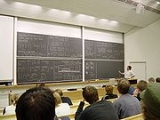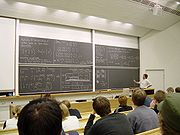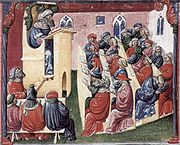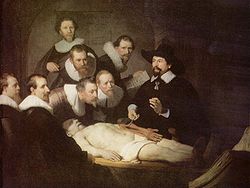
Lecture
Encyclopedia

Presentation
Presentation is the practice of showing and explaining the content of a topic to an audience or learner. Presentations come in nearly as many forms as there are life situations...
intended to present information or teach people about a particular subject, for example by a university
University
A university is an institution of higher education and research, which grants academic degrees in a variety of subjects. A university is an organisation that provides both undergraduate education and postgraduate education...
or college
College
A college is an educational institution or a constituent part of an educational institution. Usage varies in English-speaking nations...
teacher
Teacher
A teacher or schoolteacher is a person who provides education for pupils and students . The role of teacher is often formal and ongoing, carried out at a school or other place of formal education. In many countries, a person who wishes to become a teacher must first obtain specified professional...
. Lectures are used to convey critical information, history, background, theories and equations. A politician's speech, a minister's sermon, or even a businessman's sales presentation may be similar in form to a lecture. Usually the lecturer will stand at the front of the room and recite information relevant to the lecture's content.
Though lectures are much criticised as a teaching method, universities have not yet found practical alternative teaching methods for the large majority of their courses. Critics point out that lecturing is mainly a one-way method of communication
Communication
Communication is the activity of conveying meaningful information. Communication requires a sender, a message, and an intended recipient, although the receiver need not be present or aware of the sender's intent to communicate at the time of communication; thus communication can occur across vast...
that does not involve significant audience participation. Therefore, lecturing is often contrasted to active learning
Active learning
Active learning is an umbrella term that refers to several models of instruction that focus the responsibility of learning, on learners. Bonwell and Eison popularized this approach to instruction . This "buzz word" of the 1980s became their 1990s report to the Association for the Study of Higher...
. Lectures delivered by talented speakers can be highly stimulating; at the very least, lectures have survived in academia
Academia
Academia is the community of students and scholars engaged in higher education and research.-Etymology:The word comes from the akademeia in ancient Greece. Outside the city walls of Athens, the gymnasium was made famous by Plato as a center of learning...
as a quick, cheap and efficient way of introducing large numbers of students to a particular field of study.
Lectures have a significant role outside the classroom, as well. Academic and scientific awards routinely include a lecture as part of the honor, and academic conferences often center around "keynote addresses
Keynote
A keynote in literature, music, or public speaking establishes the principal underlying theme. In corporate or commercial settings, greater importance is attached to the delivery of a keynote speech or keynote address...
", i.e., lectures. The public lecture
Public lecture
A public lecture is one means employed for educating the public in the sciences and medicine. The Royal Institution has a long history of public lectures and demonstrations given by prominent experts in the field...
has a long history in the sciences and in social movement
Social movement
Social movements are a type of group action. They are large informal groupings of individuals or organizations focused on specific political or social issues, in other words, on carrying out, resisting or undoing a social change....
s. Union hall
Union Hall
Union Hall may refer to:in Australia* Union Hall , a hall and theatre in Adelaide, South Australia.in Ireland* Union Hall, County Cork a village in Irelandin the United States* Union Hall , listed on the NRHP in Maine...
s, for instance, historically have hosted numerous free and public lectures on a wide variety of matters. Similarly, churches
Church Body
A local church is a Christian religious organization that meets in a particular location. Many are formally organized, with constitutions and by-laws, maintain offices, are served by pastors or lay leaders, and, in nations where this is permissible, often seek seek non-profit corporate status...
, community centers, libraries
Library
In a traditional sense, a library is a large collection of books, and can refer to the place in which the collection is housed. Today, the term can refer to any collection, including digital sources, resources, and services...
, museum
Museum
A museum is an institution that cares for a collection of artifacts and other objects of scientific, artistic, cultural, or historical importance and makes them available for public viewing through exhibits that may be permanent or temporary. Most large museums are located in major cities...
s, and other organizations have hosted lectures in furtherance of their missions or their constituents' interests. Lectures represent a continuation of oral tradition
Oral tradition
Oral tradition and oral lore is cultural material and traditions transmitted orally from one generation to another. The messages or testimony are verbally transmitted in speech or song and may take the form, for example, of folktales, sayings, ballads, songs, or chants...
in contrast to textual communication in books and other media.
Etymology
The noun "lecture" dates from 14th century, meaning "action of reading, that which is read," from the LatinLatin
Latin is an Italic language originally spoken in Latium and Ancient Rome. It, along with most European languages, is a descendant of the ancient Proto-Indo-European language. Although it is considered a dead language, a number of scholars and members of the Christian clergy speak it fluently, and...
lectus, pp. of legere "to read." Its subsequent meaning as "oral discourse on a given subject before an audience for purposes of instruction
Education
Education in its broadest, general sense is the means through which the aims and habits of a group of people lives on from one generation to the next. Generally, it occurs through any experience that has a formative effect on the way one thinks, feels, or acts...
" is from the 16th century. The verb "to lecture" is attested from 1590.
The noun "lectern" refers to the reading desk used by lecturers.
History

Medieval university
Medieval university is an institution of higher learning which was established during High Middle Ages period and is a corporation.The first institutions generally considered to be universities were established in Italy, France, and England in the late 11th and the 12th centuries for the study of...
was for the instructor to read from an original source to a class of students who took notes on the lecture. The reading from original sources evolved into the reading of glosses on an original and then more generally to lecture notes. Throughout much of history, the diffusion of knowledge via handwritten lecture notes was an essential element of academic life.

Ferdinand de Saussure
Ferdinand de Saussure was a Swiss linguist whose ideas laid a foundation for many significant developments in linguistics in the 20th century. He is widely considered one of the fathers of 20th-century linguistics...
's Cours de linguistique générale). Many lecturers were, and still are, accustomed to simply reading their own notes from the lectern for exactly that purpose. Nevertheless, modern lectures generally incorporate additional activities, e.g. writing on a chalk-board, exercises, class questions and discussions, or student presentations.
The use of multimedia
Multimedia
Multimedia is media and content that uses a combination of different content forms. The term can be used as a noun or as an adjective describing a medium as having multiple content forms. The term is used in contrast to media which use only rudimentary computer display such as text-only, or...
presentation software such as Microsoft PowerPoint
Microsoft PowerPoint
Microsoft PowerPoint, usually just called PowerPoint, is a non-free commercial presentation program developed by Microsoft. It is part of the Microsoft Office suite, and runs on Microsoft Windows and Apple's Mac OS X operating system...
has changed the form of lectures, e.g. video, graphics, websites, or prepared exercises may be included. Most commonly, however, only outlines composed of "bullet points" are presented. Critics such as Edward Tufte
Edward Tufte
Edward Rolf Tufte is an American statistician and professor emeritus of political science, statistics, and computer science at Yale University. He is noted for his writings on information design and as a pioneer in the field of data visualization....
contend that this style of lecture bombards the audience with unnecessary and possibly distracting or confusing graphics.
Research

Bligh summarises research on memory to show the significance of the meaningfulness of material on retention (Marks and Miller 1964) and the importance of immediate rehearsal of information (Bassey 1968). He relates his own research on arousal during lectures to suggest a decrement in attention during the first 25 minutes. Lloyd (1968) and Scerbo et al. (1992) showed that students take fewer and fewer notes as lectures proceed. Bligh shows that after a short break filled by buzz group discussion, attention will recover somewhat.
The largest section of Bligh's book is devoted to lecturing technique, particularly the organisation of lectures, how to make a point, the effectiveness of taking notes, the use of handouts and ways of obtaining feedback.
Early editions of the book contained a reply paid evaluation card. This research showed that the section on alternative teaching methods within lectures was the most highly praised.
Other forms
While lecture is generally accepted as an effective form of instruction, there have been some prominent educators who have succeeded without the help of lectures.Many university
University
A university is an institution of higher education and research, which grants academic degrees in a variety of subjects. A university is an organisation that provides both undergraduate education and postgraduate education...
courses relying on lectures supplement them with smaller discussion sections, tutorial
Tutorial
A tutorial is one method of transferring knowledge and may be used as a part of a learning process. More interactive and specific than a book or a lecture; a tutorial seeks to teach by example and supply the information to complete a certain task....
s, or laboratory experiment sessions as a means of further actively involving students. Often these supplemental sections are led by graduate students, tutor
Tutor
A tutor is a person employed in the education of others, either individually or in groups. To tutor is to perform the functions of a tutor.-Teaching assistance:...
s, Teaching Assistant
Teaching assistant
A teaching assistant is an individual who assists a professor or teacher with instructional responsibilities. TAs include graduate teaching assistants , who are graduate students; undergraduate teaching assistants , who are undergraduate students; secondary school TAs, who are either high school...
s or Teaching Fellows
Fellows
Fellows or Fellowes is a surname and may refer to:People* Ailwyn Fellowes, 1st Baron Ailwyn , British businessman, farmer and politician* Carol Fellowes, 4th Baron Ailwyn , British peer...
rather than senior faculty
Faculty (university)
A faculty is a division within a university comprising one subject area, or a number of related subject areas...
. Those other forms of academic teaching include discussion (recitation
Recitation
A recitation is a presentation made by a student to demonstrate knowledge of a subject or to provide instruction to others. In some academic institutions the term is used for a presentation by a teaching assistant or instructor, under the guidance of a senior faculty member, that supplements...
if conducted by a Teaching Assistant ), seminar
Seminar
Seminar is, generally, a form of academic instruction, either at an academic institution or offered by a commercial or professional organization. It has the function of bringing together small groups for recurring meetings, focusing each time on some particular subject, in which everyone present is...
s, workshop
Workshop
A workshop is a room or building which provides both the area and tools that may be required for the manufacture or repair of manufactured goods...
s, observation
Observation
Observation is either an activity of a living being, such as a human, consisting of receiving knowledge of the outside world through the senses, or the recording of data using scientific instruments. The term may also refer to any data collected during this activity...
, practical application, case examples/case study
Case study
A case study is an intensive analysis of an individual unit stressing developmental factors in relation to context. The case study is common in social sciences and life sciences. Case studies may be descriptive or explanatory. The latter type is used to explore causation in order to find...
, experiential learning
Experiential learning
Experiential learning is the process of making meaning from direct experience. Simply put, Experiential Learning is learning from experience. The experience can be staged or left open. Aristotle once said, "For the things we have to learn before we can do them, we learn by doing them." David A...
/active learning
Active learning
Active learning is an umbrella term that refers to several models of instruction that focus the responsibility of learning, on learners. Bonwell and Eison popularized this approach to instruction . This "buzz word" of the 1980s became their 1990s report to the Association for the Study of Higher...
, computer
Computer
A computer is a programmable machine designed to sequentially and automatically carry out a sequence of arithmetic or logical operations. The particular sequence of operations can be changed readily, allowing the computer to solve more than one kind of problem...
-based instruction and tutorial
Tutorial
A tutorial is one method of transferring knowledge and may be used as a part of a learning process. More interactive and specific than a book or a lecture; a tutorial seeks to teach by example and supply the information to complete a certain task....
s.
In school
School
A school is an institution designed for the teaching of students under the direction of teachers. Most countries have systems of formal education, which is commonly compulsory. In these systems, students progress through a series of schools...
s the prevalent mode of student-teacher interaction is lesson
Lesson
A lesson is a structured period of time where learning is intended to occur. It involves one or more students being taught by a teacher or instructor...
s.
The term "parlor lecture" gained currency throughout the British Commonwealth of Nations and the United States of America during the mid-19th century. It referred to the custom of inviting noted speakers to deliver private lectures, which were typically hosted in the parlors of wealthy and socially influential families.
External links
- Short and sweet: Technology shrinks the lecture (The Chronicle of Higher Education, June 20, 2008)

